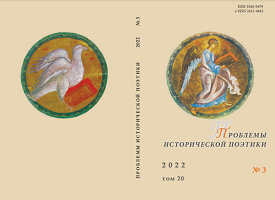Концепция человека в прозе Марины Палей в контексте открытий Ф. М. Достоевского
The Concept of Man in Prose of Marina Palei in the Context of the Discoveries of F. M. Dostoevsky
Author(s): Daria M. LednevaSubject(s): Cultural history, Russian Literature, Existentialism, Sociology of the arts, business, education, Theory of Literature
Published by: Петрозаводский государственный университет
Keywords: Marina Palei; Dostoevsky; “little man”;literary tradition; continuity; modern prose; St. Petersburg; Petersburg text; inner world; existentialism in literature; “big man”;
Summary/Abstract: The article examines the representation of the “little man” that emerged in 19th-century Russian literary criticism, and subsequently reflected in the works of Russian writers, including modern authors. However, besides the image of the “little man” constructed by the critics, Russian writers studied the human nature in their own way. The article pays special attention to the artistic discoveries of F. M. Dostoevsky, who showed the pinnacles and abysses of a person’s inner world regardless of his social circumstances. Dostoevsky showed how a rich inner world allows a person to rise above everyday life and to resurrect spiritually. In his work, Dostoevsky disavows the constitution of the “little man” proposed by Belinsky, and demonstrates the forms of opposition to the “smallness” imputed to him, the ability to soar above the social circumstances and to become a “big man” in an existential sense. Modern Russian literature proposes two ways to represent a person’s inner world. It preserves the inertial moral descriptive tradition of depicting the little man, and develops the principle of depicting a character’s spiritual growth. The article determines the artistic features of the image of a person’s inner world in the social and domestic environment in the work of Marina Palei and correlates them with the artistic discoveries of F. M. Dostoevsky on the grounds of artistic continuity and development in terms of specific historical modifications. The article also examines how Dostoevsky represents St. Petersburg. Dostoevsky’s works of the 1870s depict the disastrous existence of St. Petersburg, and Palei’s prose aggravates the image of gloomy and stuffy St. Petersburg and uncovers a sick and dying city, whose death is inevitable; a person’s everyday life and life in general proceeds with the triumph of vulgarity and meanness. The characters’ rich inner world is already powerless to soar above vulgarity or overcome it, as it occurred in Dostoevsky’s works. The characters of Marina Palei have enough courage and fortitude only to dream of breaking into an ideal world, or at least into a dream, replacing the real world with them. But, from an existential point of view, the characters of Marina Palei, like characters of Dostoevsky, retains their selfawareness as a Man (with a capital “M”), in the social circumstances of a little man looking for a way out of predestination.
Journal: Проблемы исторической поэтики
- Issue Year: 20/2022
- Issue No: 3
- Page Range: 253-273
- Page Count: 21
- Language: Russian

